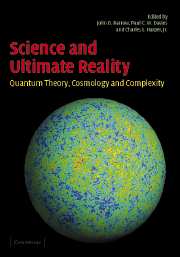Book contents
- Frontmatter
- Contents
- List of contributors
- Foreword
- Editors' preface
- Preface
- Acknowledgments
- Part I An overview of the contributions of John Archibald Wheeler
- Part II An historian's tribute to John Archibald Wheeler and scientific speculation through the ages
- Part III Quantum reality: theory
- 3 Why is nature described by quantum theory?
- 4 Thought-experiments in honor of John Archibald Wheeler
- 5 It from qubit
- 6 The wave function: it or bit?
- 7 Quantum Darwinism and envariance
- 8 Using qubits to learn about “it”
- 9 Quantum gravity as an ordinary gauge theory
- 10 The Everett interpretation of quantum mechanics
- Part IV Quantum reality: experiment
- Part V Big questions in cosmology
- Part VI Emergence, life, and related topics
- Appendix A Science and Ultimate Reality Program Committees
- Appendix B Young Researchers Competition in honor of John Archibald Wheeler for physics graduate students, postdoctoral fellows, and young faculty
- Index
7 - Quantum Darwinism and envariance
from Part III - Quantum reality: theory
Published online by Cambridge University Press: 29 March 2011
- Frontmatter
- Contents
- List of contributors
- Foreword
- Editors' preface
- Preface
- Acknowledgments
- Part I An overview of the contributions of John Archibald Wheeler
- Part II An historian's tribute to John Archibald Wheeler and scientific speculation through the ages
- Part III Quantum reality: theory
- 3 Why is nature described by quantum theory?
- 4 Thought-experiments in honor of John Archibald Wheeler
- 5 It from qubit
- 6 The wave function: it or bit?
- 7 Quantum Darwinism and envariance
- 8 Using qubits to learn about “it”
- 9 Quantum gravity as an ordinary gauge theory
- 10 The Everett interpretation of quantum mechanics
- Part IV Quantum reality: experiment
- Part V Big questions in cosmology
- Part VI Emergence, life, and related topics
- Appendix A Science and Ultimate Reality Program Committees
- Appendix B Young Researchers Competition in honor of John Archibald Wheeler for physics graduate students, postdoctoral fellows, and young faculty
- Index
Summary
Introduction
Quantum measurement problem is a technical euphemism for a much deeper and less well-defined question: How do we, “the observers,” fit within the physical universe? The problem is especially apparent in quantum physics because, for the first time in the history of science a majority of (but not all) physicists seriously entertains the possibility that the framework for the ultimate universal physical theory provided by quantum mechanics is here to stay.
Quantum physics relevant for this discussion is (contrary to the common prejudice) relatively simple. By this I mean that some of the key features of its predictions can be arrived at on the basis of overarching principles of quantum theory and without reference to the minutiae of other specific ingredients (such as the details of the forces).
Quantum superposition principle is such an overarching principle of quantum theory. It leads to predictions that seem difficult to reconcile with our perception of the familiar classical universe of everyday experience. The aim of this paper is to show that appearance of the classical reality can be viewed as a result of the emergence of the preferred states from within the quantum substrate through the Darwinian paradigm, once the survival of the fittest quantum states and selective proliferation of the information about them throughout the universe are properly taken into account.
- Type
- Chapter
- Information
- Science and Ultimate RealityQuantum Theory, Cosmology, and Complexity, pp. 121 - 137Publisher: Cambridge University PressPrint publication year: 2004
- 47
- Cited by



